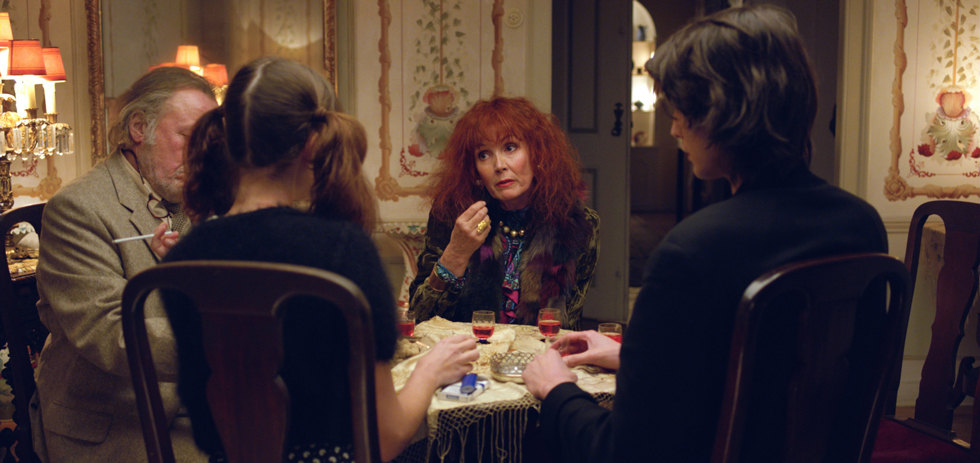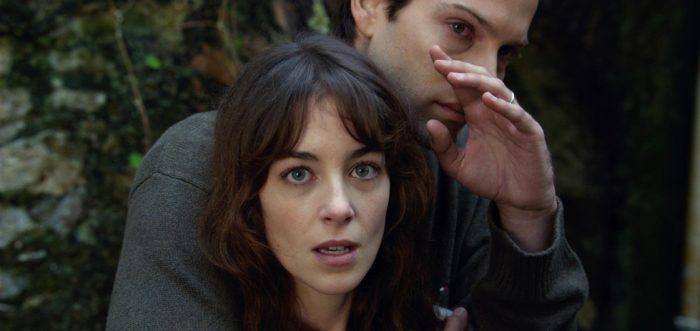
A picturesque country guesthouse becomes the setting for an erotically charged deconstructed whodunnit in Cosmos, Andrzej Żuławski’s final offering. Released in mid-2015, it appeared a full 15 years after his previous feature, Fidelity, and just six months before the director’s death. The film is an adaptation of Witold Gombrowicz’s 1965 novel, which seems an apt choice for a couple of reasons. For one, the themes of Gombrowicz’s novel – paranoia, obsession, and the roles they play in shaping perception – gel naturally with the brand of sinister hysteria with which Żuławski is synonymous. Secondly, there are some key biographical parallels between the two men: both were mavericks in their chosen field, and operated predominantly outside their native Poland, where their works were subjected to censorship. Nevertheless, both achieved icon status, both internationally and (belatedly) at home.
Żuławski’s film is self-conscious about its source material: Gombrowicz gave the protagonist of Cosmos his own name, and Żuławski compounds this implied likeness by making his Witold a reluctant law student and aspiring writer, as was his real life creator. This chain of resemblance makes the cinematic manifestation of Witold a composite figure; Zulawksi’s double of the satirical double Gombrowicz crafted for himself. Through Witold’s writerly ambitions, the film becomes a savage meditation on the very act of storytelling, implicating all three of its authors in its ultimate failure to cohere (read: make sense). Given that Żuławski is, well, quite an accomplished storyteller, the profound doubt at the heart of Cosmos makes it a surprising and poignant last word.
The film is an ensemble piece featuring a bevy of eccentric characters, helmed by the spindly and over-dramatic Witold (Jonathan Genet). Whilst staying at a bed and breakfast, he and his unlikely friend Fuchs (a snappy dressing anti-intellectual with a hairstyle that should not have escaped 2003, played by Johan Libéreau), become psychologically and sexually entangled with the family that run the joint. The action coalesces around a series of creepy, vaguely supernatural discoveries made by Witold, and his burgeoning fascination with the two young women of the household: the newlywed Lena, a moody teacher (Victória Guerra), and Catherette (Clémentine Pons), the naïve and nervous maid who bears a wormlike deformity on her lip.
As the mysterious signs proliferate – a hanged sparrow on a wooded path, an arrow formed by soot patterns on the ceiling – his interest in Lena and Catherette becomes a sexual fixation, and Witold finds himself pitched into condensed, rapid-onset existential crises with increasing regularity. These crises induce in him troubling behavioural tics and an unfortunate tendency to soliloquise almost constantly.
At least his paroxysms of angst seem to fit right in with the hyper-quirky residents: Madame Woytis, the matriarch of the household (Sabine Azéma), periodically gets so worked up that she simply freezes (like those ‘living statues’ found outside tourist attractions), whilst her husband, Léon (Jean-François Balmer), speaks in his own riddling idiom filled with nonsense words (he too has been bitten by the soliloquising bug). Actually, riddles and allusions seem to pepper everyone’s speech: these literary and cinematic references act as meta-commentary on the film’s action, and a none-too-subtle foreshadowing technique. Of note is Fuchs’s enthusiasm for Pasolini’s Teorema, which follows a mysterious young man’s visit to a bourgeois home, where he beds and perverts each family member. Sure enough, Fuchs winds up bonking almost half of the characters (or so it is implied) over the course of Cosmos, including Lena’s new husband, Lucien (Andy Gillet).
Gombrowicz’s playfully verbose style as reworked by Żuławski gives the adaptation a theatrical quality, with characters tending to veer off into monologues, sometimes nominally addressed to others, but just as often to themselves, or a laptop – Witold regularly stands hunched over his computer, wildly typing, spouting purple prose with such intensity that his screen must be covered with spittle. The whole film brims with skittish energy, particularly during the multiple dinner scenes, in which the camera is always fretting over the passing of dishes/the lighting of cigarettes/the spilling of peas, as conversations bounce around the table. Madame Woytis lapsing into her brief paralyses lends a surrealist air to the goings-on.

In contrast to the slow-burning horror of Żuławski’s most famous work, Possession, Cosmos comes off as weirdly farcical, though the films share a preoccupation with the inexplicable and the grotesque. As the plot unfolds and mysteries multiply, the energy on screen remains fairly constant (it never reaches the fever-pitch craziness of Possession), but the narrative itself seems to collapse under the weight of so many strange omens. Are the hanged bird and the arrow on the ceiling clues, able to lead Witold closer to some kind of truth? Or are they benign objects, inadvertently leading him into madness? Does it matter?
By the time of the film’s denouement in the woods, formal convention itself breaks down: characters leer into the camera in close up, on the verge of breaking the fourth wall, the schmaltzy score becomes liable to break off suddenly, and the dolly track running along the forest floor is left in shot. It seems as if the director is faltering, unable to commit to the story world he has created. This suspicion is confirmed in the final scene, in which the narrative bifurcates: Witold is shown returning home from his trip both with and without Lena, the object of his disturbing passions, Żuławski intercutting the two scenarios. (This fork in the story is hinted at by the two-pronged stick that Léon takes into the woods, which he has kept for 17 years – another of the film’s loaded objects.)
Żuławski experimented with doubling in a number of films, including Possession, in which Isabelle Adjani occupied a dual role. Cosmos recapitulates this trope, featuring Clémentine Pons as both Catherette and Ginette, Lena’s best friend and the maid’s exact doppelganger, sans the mangled lip. But doubling infests Cosmos, from the film’s mitosis in its final minutes to the multiple levels of authorship at play, pointing toward the inherent multiplicity, or rather, duplicity, of any act of artistic creation or narration.
Even after the film’s double-take ending, one final surprise awaits: the credits roll over a bizarre behind-the-scenes sequence. It’s not exactly a bloopers reel (this is Żuławski we’re talking about), but it performs a similar function, humorously rupturing the film’s semblance of reality, or whatever’s left of it. In showing his directorial hand and revealing the constructed nature of the medium, Żuławski breaks his work into so many pieces, and leaves the viewer to put them together. Cosmos is a masterful, if at times exasperating, exploration of the concomitant fertility and futility in textual worlds; the pieces of its puzzle can be endlessly rearranged because, as Witold comes to realise (and Fuchs’s dalliances suggest), “There are no impossible combinations.”
